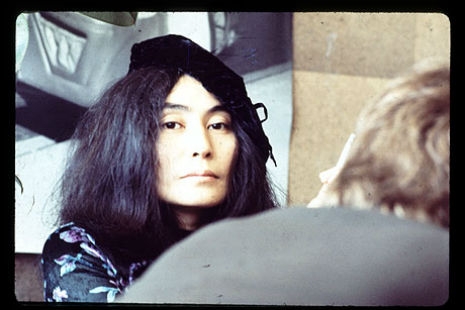
Boing Boing’s Xeni Jardin, currently traveling in Japan, met up with Yoko Ono and conducted a great interview with the artist/humanitarian, who had just been awarded the 8th Hiroshima Art Prize. The Hiroshima Museum of Contemporary Art is displaying “The Road of Hope: Yoko Ono 2011,” until October 16, 2011.
Xeni Jardin: A few days ago, you were in Hiroshima accepting an award for your your legacy of art in the service of peace. You were a young girl here in Japan when the event happened. What was that day like?
Yoko Ono: Yes, I think I was 12. It was a shock of course, but at the time, initially we didn’t know what happened. I heard about it from somebody in the village. It’s a very, very different kind of bomb, they said, we have to immediately stop the war. It didn’t make sense to me at all, in any way. We didn’t understand.
Xeni Jardin: At what point did the magnitude or the nature of what had happened become more clear to you?
Yoko Ono: Well, every day, from then on. They were reporting in newspapers and magazines what happened in Hiroshima and Nagasaki and it was just—it was something that you just could not understand. It was just so bad.
Xeni Jardin: Trying to grasp the full scope of what had happened must have been something that unfolded over many years for you, your family, and for all of your fellow countrymen and women.
Yoko Ono: Well you see, it was because of Pearl Harbor, and so the rest of the world was very, very cold to us when the bombs dropped. Like, “Oh, they deserved it.” That kind of thinking.
And of course in those days, the idea of what an enemy is, and what is fair to do to enemies were very different. For America to have bombed civilians was something that most people accepted. But women and children, old and young, they all suffered. If it had happened not to Japan but in a Western country, maybe the West would have felt differently about it. But that’s how it was. And the Japanese people, especially the people of Hiroshima and Nagasaki, they had to endure the whole thing without any kindness or compassion from the world. Despite the meanness directed at them, even after the bombing, they stood up and survived, and they created a normal situation out of the ashes of that horror, which I believe is amazing.
The whole of Japan helped them. I learned when I was in Hiroshima, for instance, that many trees were sent from other towns throughout Japan, to be planted there to renew the bare ground. People throughout the country tried to help, but Hiroshima and Nagasaki had to stand up on their own, as well, of course.
And in a very strange way, even though they were victims and martyrs of a terrible thing, now they are not victims. They are the people who created a strong, strong recovery. They show to the world that this is what we can do, instead of all the myths that were created about those places — the myth that you could never enter those places after what happened, and that you couldn’t return into those cities. Just walking in there is dangerous.
But now, they’re two beautiful cities again. And the world sees that.
Read more of Xeni Jardin’s interview with Yoko Ono at Boing Boing.
Below, a fucking fierce Beatles/Yoko jam session in an outtake from Let It Be: